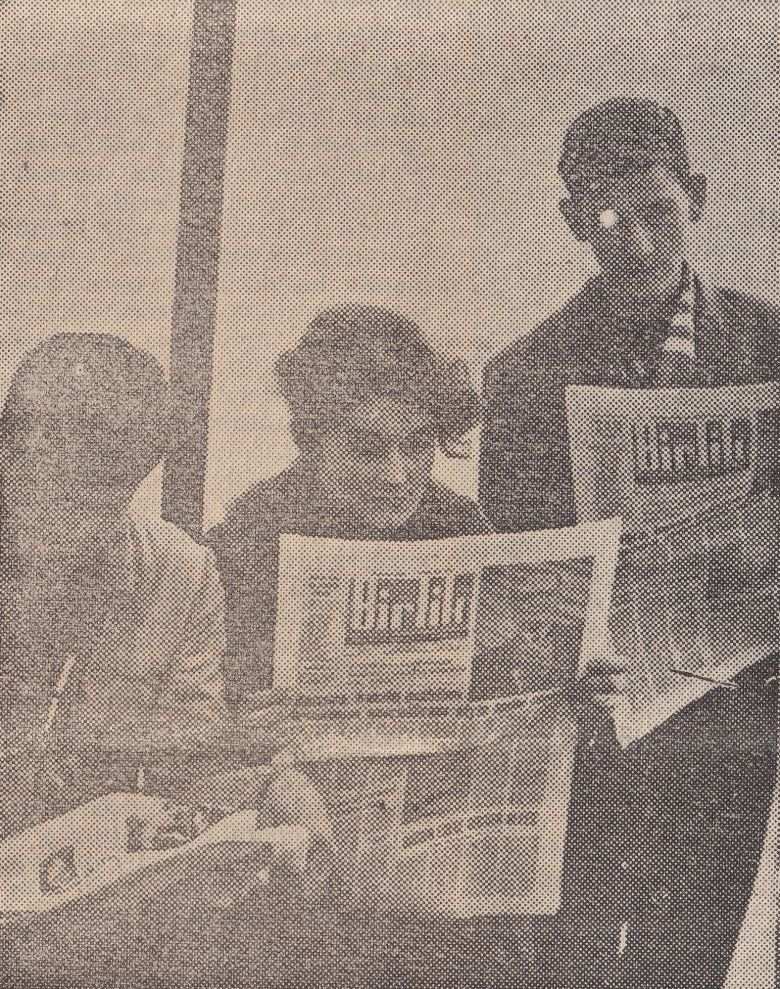Exhibition:
Translated into Socialism
Salt Galata
October 24, 2024 – February 23, 2025

Birlik, Skopje, December 27, 1964
Translated into Socialism presents the little-known history of the Turkish-speaking community in Yugoslavia, more precisely, in Kosovo and Macedonia. It explores how, in a multinational social context, a Turkish identity was affirmed and transformed under socialist ideology.
The historical scope of Translated into Socialism goes back to 1920, the year when a part of the oppressed Muslim population in the Kingdom of Yugoslavia saw their redemption in leftist ideas. It traces the story of a new generation of activists who helped clear the way for a socialist future, a vision that was violently interrupted by the monarchic regime. Building upon this legacy, the exhibition expands into the new reality of the Socialist Yugoslavia until the late 1980s.
Even though the Turkish-speaking community officially constituted a small part of the population, policies towards national minorities enabled the proliferation of numerous initiatives operating in the Turkish language. These included newspapers, periodicals, schools, and various cultural and political organizations. The interconnectedness of these initiatives facilitated a nuanced perspective that challenges mainstream approaches to nationalism and questions the “totalitarian” and “ethno-nationalist” discourse of Yugoslavia, consolidated by its traumatic breakup during the 1990s wars.
Translated into Socialism reworks historical materials sourced from private archives and public libraries, many of which are being unearthed for the first time. These materials are juxtaposed with contemporary works by Mustafa Emin Büyükcoşkun, Yane Calovski, Hana Miletić, Ahmet Öğüt, Fevzi Tüfekçi, and Dilek Winchester. The exhibition explores the construction of a national consciousness based on internationalism and solidarity, while revealing how the historical distinctiveness of Yugoslavia’s socialism, such as self-management and non-alignment, shaped the ways the Turkish-speaking community was imagined. Highlighting new cultural forms arising from these complex dynamics, it weaves together an unfamiliar story that remains unique and relevant.
Translated into Socialism is programmed by Sezgin Boynik, Tevfik Rada, and Merve Elveren and realized in collaboration with the Lumbardhi Foundation (Kosovo). Accompanying public programs will be announced soon at saltonline.org and Salt’s social media channels.
* * *
Program: Merve Elveren
Research: Sezgin Boynik, Tevfik Rada (Pykë-Presje)
Artists: Mustafa Emin Büyükcoşkun, Yane Calovski, Hana Miletić, Ahmet Öğüt, Fevzi Tüfekçi, Dilek Winchester
Exhibition Coordinator: Sezin Romi
Exhibition Design and Production: Emirhan Altuner
Editor: Ezgi Yurteri
Graphic Design: Bardhi Haliti
Communication Design: Emirhan Altuner, Elif Tuna
Installation: Eray Özcan, Burak Bodur, Fiksatif, OCD Museum Works, 3T Reklam
Acknowledgments: Gönül Bektaş; Tacida & Nimetullah Hafız; Altay Suroy; BAL-TAM, Balkan Center for Turkological Studies (Prizren); Cinematheque of North Macedonia Archive; Museum of the Republic of North Macedonia; Museum of Revolution, Phototheque Collection, Museum of Kosovo; The Macedonian Academy of Sciences and Arts, Archive of the History Department (Skopje); TÜSTAV (Istanbul); Museum of Yugoslavia Archive (Belgrade)
The exhibition is realized with the contributions of Asya International Movers, Eureko Sigorta, and Jotun.
The historical scope of Translated into Socialism goes back to 1920, the year when a part of the oppressed Muslim population in the Kingdom of Yugoslavia saw their redemption in leftist ideas. It traces the story of a new generation of activists who helped clear the way for a socialist future, a vision that was violently interrupted by the monarchic regime. Building upon this legacy, the exhibition expands into the new reality of the Socialist Yugoslavia until the late 1980s.
Even though the Turkish-speaking community officially constituted a small part of the population, policies towards national minorities enabled the proliferation of numerous initiatives operating in the Turkish language. These included newspapers, periodicals, schools, and various cultural and political organizations. The interconnectedness of these initiatives facilitated a nuanced perspective that challenges mainstream approaches to nationalism and questions the “totalitarian” and “ethno-nationalist” discourse of Yugoslavia, consolidated by its traumatic breakup during the 1990s wars.
Translated into Socialism reworks historical materials sourced from private archives and public libraries, many of which are being unearthed for the first time. These materials are juxtaposed with contemporary works by Mustafa Emin Büyükcoşkun, Yane Calovski, Hana Miletić, Ahmet Öğüt, Fevzi Tüfekçi, and Dilek Winchester. The exhibition explores the construction of a national consciousness based on internationalism and solidarity, while revealing how the historical distinctiveness of Yugoslavia’s socialism, such as self-management and non-alignment, shaped the ways the Turkish-speaking community was imagined. Highlighting new cultural forms arising from these complex dynamics, it weaves together an unfamiliar story that remains unique and relevant.
Translated into Socialism is programmed by Sezgin Boynik, Tevfik Rada, and Merve Elveren and realized in collaboration with the Lumbardhi Foundation (Kosovo). Accompanying public programs will be announced soon at saltonline.org and Salt’s social media channels.
Program: Merve Elveren
Research: Sezgin Boynik, Tevfik Rada (Pykë-Presje)
Artists: Mustafa Emin Büyükcoşkun, Yane Calovski, Hana Miletić, Ahmet Öğüt, Fevzi Tüfekçi, Dilek Winchester
Exhibition Coordinator: Sezin Romi
Exhibition Design and Production: Emirhan Altuner
Editor: Ezgi Yurteri
Graphic Design: Bardhi Haliti
Communication Design: Emirhan Altuner, Elif Tuna
Installation: Eray Özcan, Burak Bodur, Fiksatif, OCD Museum Works, 3T Reklam
Acknowledgments: Gönül Bektaş; Tacida & Nimetullah Hafız; Altay Suroy; BAL-TAM, Balkan Center for Turkological Studies (Prizren); Cinematheque of North Macedonia Archive; Museum of the Republic of North Macedonia; Museum of Revolution, Phototheque Collection, Museum of Kosovo; The Macedonian Academy of Sciences and Arts, Archive of the History Department (Skopje); TÜSTAV (Istanbul); Museum of Yugoslavia Archive (Belgrade)
The exhibition is realized with the contributions of Asya International Movers, Eureko Sigorta, and Jotun.

